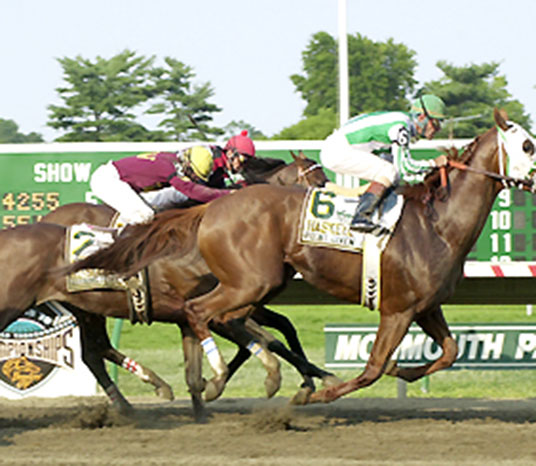By KENNY WALTER
Staff Writer
OCEANPORT — New Jersey’s multi-year pursuit of legalized sports betting took another hit last week after a federal court ruled against the state law allowing sports betting at casinos and racetracks.
Dennis Drazin, adviser to the New Jersey Thoroughbred Horsemen’s Association, which operates Monmouth Park, said the 10-2 ruling by the Third Circuit Court of Appeals did not surprise him.
“Based on the oral arguments and my listening to what the judges were asking, I was not overly surprised by the decision,” Drazin said. “I thought the court would most likely say you can’t do it the way that the law reads where you limit to just racetracks and casinos.”
The state was seeking to overturn a 2015 decision in which two of three Third Circuit Court of Appeals judges ruled that New Jersey’s 2014 law deregulating sports wagering violates federal law. The case pits the defendants — who include the New Jersey Racing Commission, the thoroughbred horsemen and the New Jersey Sports and Exposition Authority — against the four major professional sports leagues, which are Major League Baseball, National Football League, National Basketball Association and the National Hockey League, and the National Collegiate Athletic Association.
With the Aug. 9 ruling, Drazin said the state is left with two options — appeal to the United States Supreme Court and have the Legislature pass a full repeal of the sports betting prohibition, both of which he expects to move forward.
“We certainly intend to pursue our rights to file a petition to the Supreme Court,” he said. “I think the petition to the Supreme Court will be soon, and I think the question of the repeal is something that the Legislature and the front office will have to consider and decide if they want to go that route.”
The state’s current attempt to legalize sports betting is to have a partial repeal of the law prohibiting sports wagering to allow only casinos and racetracks to operate a sports book. Drazin said after the latest court ruling the state may opt to have a full repeal of the sports betting prohibition.
“I thought they would give us a little more guidance on what you could do on a partial repeal,” Drazin said. “It is clear to me what you can do and what we are going to pursue is a full repeal, and if you repeal all of the laws and you don’t just limit it to racetracks and casinos I don’t think the leagues would have a basis to challenge us.
“If there is a full repeal, then any business enterprise could probably open up a gambling enterprise.”
According to Drazin, if sports betting is eventually legalized a significant portion of the illegal sports betting market will be eliminated.
“Right now we know that this is a $400 billion illegal enterprise in this country, and I think New Jersey’s share of that enterprise is probably at least $10 billion,” he said. “I think that if you have legitimate businesses that open up like racetracks and casinos, 50 percent of that illegal market would move to trusted safe sites and the rest of it is going on now anyway.”
The federal government banned sports betting in 1992 with the passage of the Professional and Amateur Sports Protection Act of 1992 (PASPA), and states were given a window of one year to legalize it. Only Nevada, Delaware, Montana and Oregon chose to do so.
Of the four states currently exempt, only Nevada has large-scale sports betting, while the other three states currently have limited wagering.
However, if the state is successful in their pursuit of sports betting a scenario may be in place where the federal prohibition is removed.
“I think what it will do is if the leagues understand clearly that New Jersey is going to have sports betting, it may motivate them to go run to Congress to try to get federal regulation and repeal PASPA,” Drazin said.

